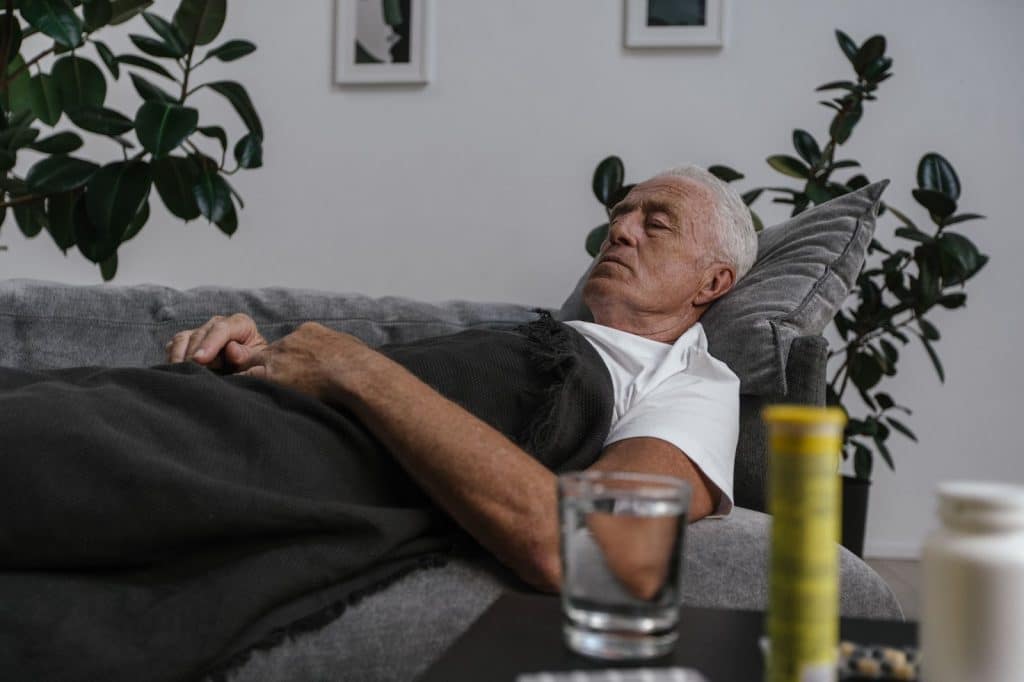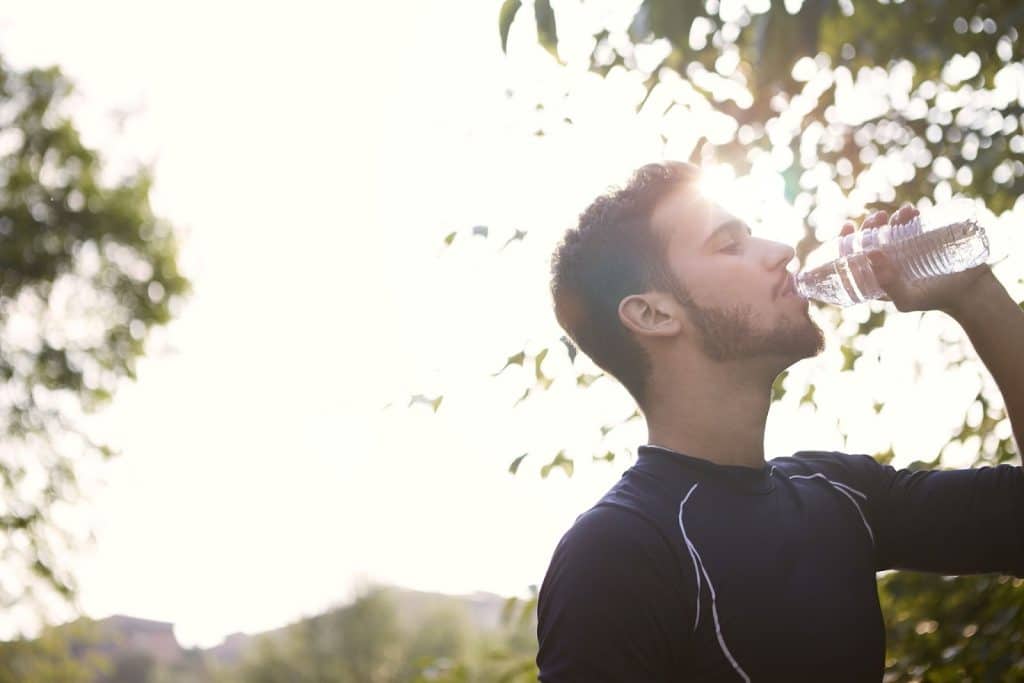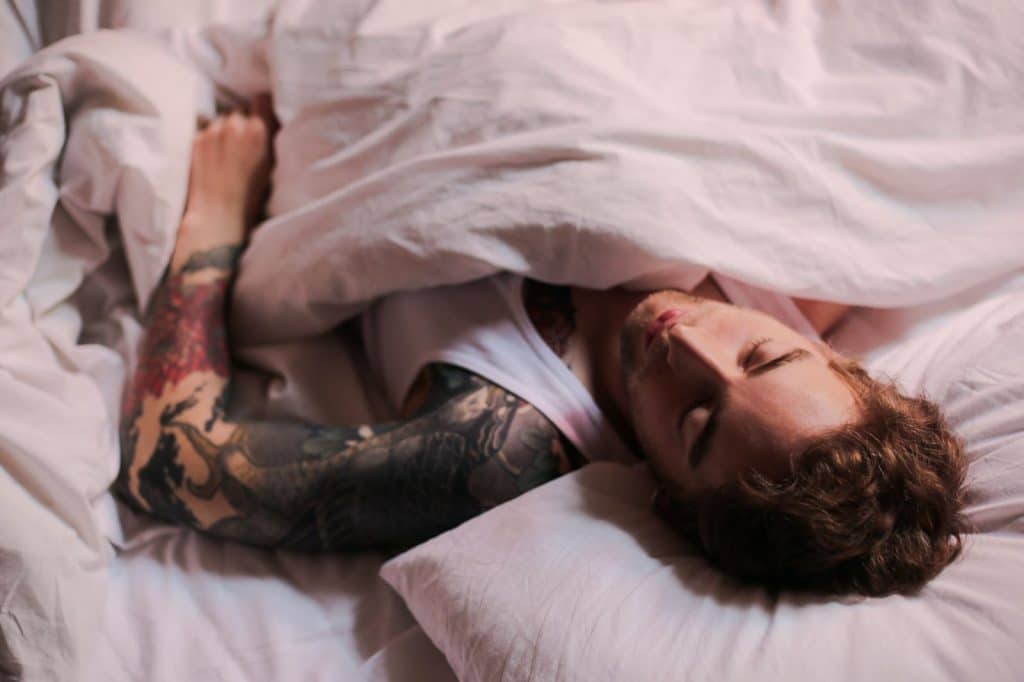Generally, we should sleep between 6 and 9 hours a night, which is a long time to go without water. While it’s not necessary to set the alarm to wake us up for water breaks during the night, we can do a few things to prevent ourselves from dehydrating while we sleep.
You can prevent dehydration during sleep by drinking a pint of water before bed, having a glass of water on your bedside table to sip from if you wake during the night, and hitting the water first thing in the morning (even before coffee!).
Read on for more tips on preventing dehydration during sleep and what causes it.

What are the Causes of Dehydration While Sleeping
Water is essential for survival. Every system in the body depends on water to function correctly.
Dehydration can occur when you don’t have enough water in your body or when you lose too much water. Your body loses water through urine, sweat, and breathing. There are also a few different things that can cause dehydration while you sleep.
The most common cause is not drinking enough fluids during the day. If you don’t drink enough water during the day, your body won’t have enough to replace the fluids it loses overnight.
Other causes include:
- Excessive sweating during the night
- Vomiting or diarrhea
- Fever
- Certain medications (such as diuretics)
- Illness (such as the flu)
Symptoms of Dehydration
Dehydration can hurt your sleep by disrupting your circadian rhythm, leading to sleep disturbances, insufficient sleep, and poor sleep quality.
It can be mild, moderate, or severe, depending on how much of your body’s fluid is lost.
- Mild dehydration is when you lose between 1% and 2% of your body’s fluid.
- Moderate dehydration is when you lose 7% to 10% of your body’s fluid.
- Severe dehydration is when you lose more than 10% of your body’s fluid.
The symptoms of dehydration can vary depending on how severe it is. In mild cases, you feel thirsty and have a dry mouth.
In more severe cases, you experience:
- Extreme thirst
- Dry skin
- Fatigue
- Frequent Headaches
- Dizziness or lightheadedness
- Unpleasant muscle cramps
- Nausea or vomiting
- Rapid heartbeat
- Fainting
These signs add to sleep deprivation. If you experience any of these symptoms, it’s essential to seek medical attention immediately, as it can quickly become a life-threatening condition if not treated correctly.
How to Prevent Dehydration During Sleep
The connection between hydration and a good sleep cycle is an important one. People who have a short sleep duration or suffer from insufficient sleep should take specific measures to avoid dehydration.
In short, you cannot have a healthy and normal sleep cycle without regular inadequate hydration.
Fortunately, you can do a few things to prevent dehydration while you sleep. Following these simple tips can stay hydrated and avoid potential health risks.
Drink Plenty of Fluids During the Day
The best way to avoid dehydration while you sleep is to drink water throughout the day, not just when thirsty.

Make sure you’re drinking water at least 8 glasses each day. You need to drink even more if you live in a hot climate, exercise frequently, or are ill.
Nothing works quite as well as water for preventing dehydration, but you can also drink caffeinated beverages, fruit juices, and even sports drinks in moderation.
Avoid Diuretics Before Bed
It’s also a good idea to avoid diuretics before bed, as they can promote dehydration. Diuretics are substances that promote urination, and they include caffeine, alcohol, and some medications.
If you have to take a diuretic, drink extra fluids during the day to offset the dehydration.
Check your urine color if you’re not sure you drink enough fluids during the day. You need to drink more liquids if it’s dark yellow or amber. You should also try to urinate at least every 4 hours during the day to prevent dehydration.
Read also: What are the best teas for sleep?
Be Mindful of Your Sleep Positions
You can take a few other steps if you’re still worried about dehydration during sleep.

Try to sleep on your back, as this will help reduce the amount of time you spend lying on your stomach. This position will also help prevent wrinkles.
If you have trouble sleeping on your back, try sleeping on your left side. This position will also help reduce the risk of dehydration, allowing your body to absorb fluids better.
Read also: Does sleeping on your back flatten your butt?
Invest in A Humidifier
If you live in a dry climate or suffer from allergies, investing in a humidifier can help prevent dehydration while you sleep.
Humidifiers add moisture to the air, which can help keep your skin and mucous membranes from drying out. Just clean it regularly to avoid mold and bacteria growth.
Read also: Can you sleep with a fan and a humidifier on?
Stay Hydrated Throughout the Night
A good night’s sleep is essential for our well-being – but so is regular water intake. So, how does one find the perfect balance to ensure great sleep and keep dehydration at bay?
The trick is keeping hydrated throughout the day. We, humans, need a minimum of 2 liters of water a day to keep our waterworks well regulated.
According to the Mayo Clinic, it should be around 15.5 cups (3.7 liters) of fluids a day for men and about 11.5 cups (2.7 liters) of fluids a day for women. If this is achieved, this will help sustain us throughout the night – provided we begin our day with a glass of water as soon as we wake up.
If you have trouble sleeping through the night, try drinking a glass of water before bed, this will help keep you hydrated if you wake up at night. You can also keep a bottle of water by your bed so you can easily take a few sips if you wake up thirsty.
Limit Alcohol Intake
As mentioned above, avoiding alcoholic beverages before bed is essential, as they can promote dehydration.
If you do drink alcohol, be sure to drink plenty of water as well. Limiting your alcohol intake, in general, is also a good idea, as excessive alcohol consumption can lead to chronic dehydration.
Avoid Caffeinated Beverages in the Afternoon and Evening
Caffeinated beverages can also promote dehydration. If you drink coffee, tea, or soda, be sure to drink extra water during the day to offset the dehydrating effects of caffeine. It’s best to avoid caffeine during the afternoon and evening, as it can interfere with sleep.

Use the Restroom Before Going to Bed
It’s always a good idea to use the restroom before bed, as this will help reduce the risk of dehydration during sleep, as you’ll be less likely to wake up with an urge to urinate.
Wear Loose-Fitting Clothing to Bed
If you usually sleep in tight-fitting clothing, it might be time to switch to something more comfortable. Wearing loose-fitting clothing to bed can help improve airflow and prevent your skin from drying out overnight.
Apply A Moisturizer Before Bed
If you’re prone to dry skin, applying a moisturizer before bed can help prevent dehydration.
Moisturizers help keep your skin hydrated by trapping water in the outer layer of your skin. Choose a moisturizer that’s right for your skin type and apply it to your face and body before bed.
Drink Extra Fluids When You’re Sick
Our bodies will require regular fluid intake when recovering from physical illness or injury – particularly diarrhea, which makes our bodies lose water rapidly. So be sure to drink plenty of water, juice, and soup.
You can also use a saline nasal spray to help keep your nasal passages moist.
Drink Plenty of Fluids When You Wake Up
As soon as you wake up, drink a glass of water or another hydrating beverage.
It will help replenish the fluids your body lost while you were sleeping. If you’re not thirsty, that’s okay. Just make sure to drink fluids throughout the day to stay hydrated.
The morning water will also help you meet your daily water needs.

When to See A Doctor
Most people can prevent dehydration by drinking plenty of fluids and taking simple precautions.
However, you must see a doctor if you’re vomiting, have diarrhea, or sweating a lot.
You should also see a doctor if you cannot keep fluids down or urinate less than usual. If you’re unsure whether you’re dehydrated, it’s always best to avoid caution and see a doctor.
Sleep & Hydration: FAQs
How much water should I drink before bed?
There is no specific amount of water you should drink before bed. However, it’s essential to drink enough fluids during the day to be adequately hydrated when you go to sleep. A good rule of thumb is to drink 8 glasses of water daily.
Can dehydration cause insomnia?
Yes, dehydration can cause insomnia.
When you’re dehydrated, your body isn’t able to properly regulate its temperature, which can make it difficult to fall asleep and stay asleep. Dehydration can also lead to morning headaches, making it hard to wake up feeling rested.
What is the best thing to drink before bed?
The best thing to drink before bed is water. However, you can also drink milk or herbal tea if you’re not thirsty. Avoid sugary drinks and alcoholic beverages before bed, as they can promote dehydration.
Can I drink coffee before bed?
It’s best to avoid caffeine in the evening, as it can cause dehydration and insomnia. If you drink coffee before bed, drink plenty of water throughout the day to stay hydrated.
Conclusion: How to Prevent Dehydration During Sleep?
Dehydration can significantly impact your cognitive function, energy levels, and mood. By following these simple tips to prevent dehydration during sleep, you can ensure that you wake up feeling refreshed and ready to take on the day!
